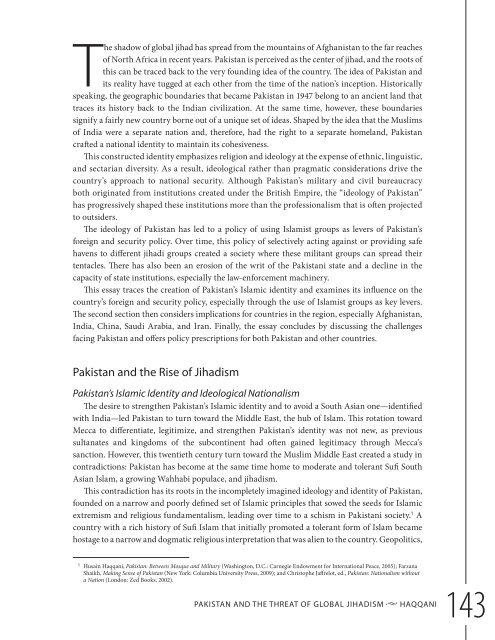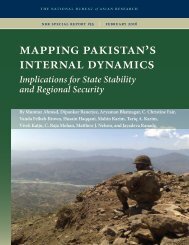pakistan’s
SR55_Mapping_Pakistan_February2016
SR55_Mapping_Pakistan_February2016
You also want an ePaper? Increase the reach of your titles
YUMPU automatically turns print PDFs into web optimized ePapers that Google loves.
The shadow of global jihad has spread from the mountains of Afghanistan to the far reaches<br />
of North Africa in recent years. Pakistan is perceived as the center of jihad, and the roots of<br />
this can be traced back to the very founding idea of the country. The idea of Pakistan and<br />
its reality have tugged at each other from the time of the nation’s inception. Historically<br />
speaking, the geographic boundaries that became Pakistan in 1947 belong to an ancient land that<br />
traces its history back to the Indian civilization. At the same time, however, these boundaries<br />
signify a fairly new country borne out of a unique set of ideas. Shaped by the idea that the Muslims<br />
of India were a separate nation and, therefore, had the right to a separate homeland, Pakistan<br />
crated a national identity to maintain its cohesiveness.<br />
This constructed identity emphasizes religion and ideology at the expense of ethnic, linguistic,<br />
and sectarian diversity. As a result, ideological rather than pragmatic considerations drive the<br />
country’s approach to national security. Although Pakistan’s military and civil bureaucracy<br />
both originated from institutions created under the British Empire, the “ideology of Pakistan”<br />
has progressively shaped these institutions more than the professionalism that is oten projected<br />
to outsiders.<br />
The ideology of Pakistan has led to a policy of using Islamist groups as levers of Pakistan’s<br />
foreign and security policy. Over time, this policy of selectively acting against or providing safe<br />
havens to different jihadi groups created a society where these militant groups can spread their<br />
tentacles. There has also been an erosion of the writ of the Pakistani state and a decline in the<br />
capacity of state institutions, especially the law-enforcement machinery.<br />
This essay traces the creation of Pakistan’s Islamic identity and examines its influence on the<br />
country’s foreign and security policy, especially through the use of Islamist groups as key levers.<br />
The second section then considers implications for countries in the region, especially Afghanistan,<br />
India, China, Saudi Arabia, and Iran. Finally, the essay concludes by discussing the challenges<br />
facing Pakistan and offers policy prescriptions for both Pakistan and other countries.<br />
Pakistan and the Rise of Jihadism<br />
Pakistan’s Islamic Identity and Ideological Nationalism<br />
The desire to strengthen Pakistan’s Islamic identity and to avoid a South Asian one—identified<br />
with India—led Pakistan to turn toward the Middle East, the hub of Islam. This rotation toward<br />
Mecca to differentiate, legitimize, and strengthen Pakistan’s identity was not new, as previous<br />
sultanates and kingdoms of the subcontinent had oten gained legitimacy through Mecca’s<br />
sanction. However, this twentieth century turn toward the Muslim Middle East created a study in<br />
contradictions: Pakistan has become at the same time home to moderate and tolerant Sufi South<br />
Asian Islam, a growing Wahhabi populace, and jihadism.<br />
This contradiction has its roots in the incompletely imagined ideology and identity of Pakistan,<br />
founded on a narrow and poorly defined set of Islamic principles that sowed the seeds for Islamic<br />
extremism and religious fundamentalism, leading over time to a schism in Pakistani society. 1 A<br />
country with a rich history of Sufi Islam that initially promoted a tolerant form of Islam became<br />
hostage to a narrow and dogmatic religious interpretation that was alien to the country. Geopolitics,<br />
1 Husain Haqqani, Pakistan: Between Mosque and Military (Washington, D.C.: Carnegie Endowment for International Peace, 2005); Farzana<br />
Shaikh, Making Sense of Pakistan (New York: Columbia University Press, 2009); and Christophe Jaffrelot, ed., Pakistan: Nationalism without<br />
a Nation (London: Zed Books, 2002).<br />
PAKISTAN AND THE THREAT OF GLOBAL JIHADISM u HAQQANI<br />
143



